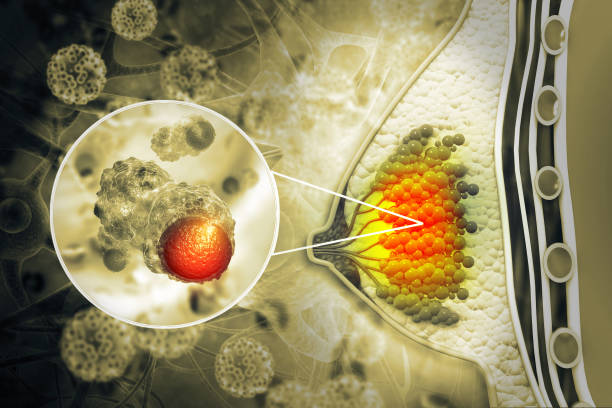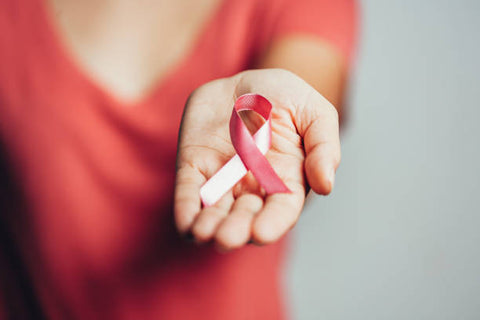Introduction
Breast cancer is one of the most common types of cancer affecting women worldwide. It occurs when abnormal cells in the breast tissue divide and grow uncontrollably. Early detection and treatment are crucial for increasing the chances of a successful outcome. In this blog, we will explore the symptoms, causes, and treatment options for breast cancer.

Symptoms of Breast Cancer

- Lump in the breast: A lump or mass in the breast is the most common symptom of breast cancer. It may feel hard and irregular in shape.
- Change in breast size or shape: This can include swelling, shrinkage, or asymmetry in the breasts.
- Nipple discharge: Nipple discharge, especially if it is bloody, may be a sign of breast cancer.
- Skin changes: The skin over the breast may appear dimpled, red, or scaly.
- Pain in the breast: Pain in the breast, especially if it is not related to the menstrual cycle, may be a symptom of breast cancer.
Causes of Breast Cancer
- Genetics: A family history of breast cancer increases the risk of developing the disease.
- Age: The risk of developing breast cancer increases with age.
- Hormones: Exposure to estrogen, such as through hormonal replacement therapy or early onset of menstrual cycles, increases the risk of breast cancer.
- Lifestyle factors: Lifestyle factors such as alcohol consumption, lack of physical activity, and obesity can increase the risk of developing breast cancer.
Treatment Options for Breast Cancer
- Surgery: Surgery is a common treatment for breast cancer and may involve removing the entire breast (mastectomy) or just the cancerous portion (lumpectomy).
- Radiation therapy: Radiation therapy uses high-energy beams to kill cancer cells and shrink tumors.
- Chemotherapy: Chemotherapy is a type of drug treatment that kills cancer cells and can be administered orally or intravenously.
- Hormonal therapy: Hormonal therapy is used to block hormones that help the cancer cells grow.
- Targeted therapy: Targeted therapy is a type of treatment that targets specific molecules involved in the growth and spread of cancer cells.
Conclusion
Breast cancer is a serious and potentially life-threatening condition that affects many women worldwide. Early detection and treatment are crucial for increasing the chances of a successful outcome. If you are experiencing symptoms such as a lump in the breast, skin changes, or nipple discharge, it is important to speak with a doctor to receive appropriate evaluation and treatment. By staying informed about the symptoms, causes, and treatment options for breast cancer, you can help protect yourself and those you love from this devastating disease.
FAQS
- How is breast cancer diagnosed?
-
Breast cancer is typically diagnosed through a combination of a physical examination, mammogram, and biopsy.
- What are the treatment options for breast cancer?
-
The treatment options for breast cancer may include surgery, radiation therapy, chemotherapy, hormonal therapy, and targeted therapy. The best treatment plan will depend on the individual case and may include a combination of these treatments.
- Can breast cancer be prevented?
-
There is no sure way to prevent breast cancer, but some measures that may help reduce the risk include maintaining a healthy lifestyle, getting regular breast cancer screenings, and avoiding risk factors such as excessive alcohol consumption and hormone therapy.
- Is breast cancer hereditary?
-
A family history of breast cancer can increase the risk of developing the disease, but it is not the only factor. Other risk factors such as age and lifestyle also play a role.
- How does radiation therapy work for breast cancer?
-
Radiation therapy uses high-energy beams to kill cancer cells and shrink tumors. It is often used in conjunction with other treatments such as surgery or chemotherapy.
- How long does chemotherapy treatment for breast cancer last?
-
The length of chemotherapy treatment for breast cancer will vary depending on the individual case and the type of chemotherapy being used. Some treatments may last just a few weeks, while others may last several months.
- Is breast cancer treatable?
- Yes, breast cancer is treatable. Early detection and treatment are crucial for increasing the chances of a successful outcome. With the right combination of treatments and support, many people with breast cancer are able to recover and live long, healthy lives.












